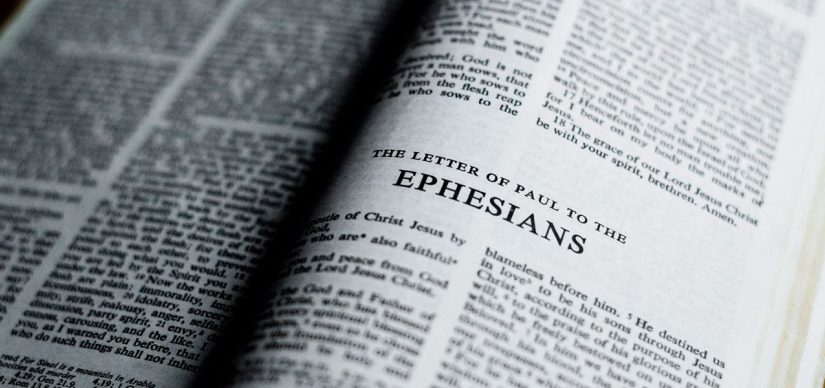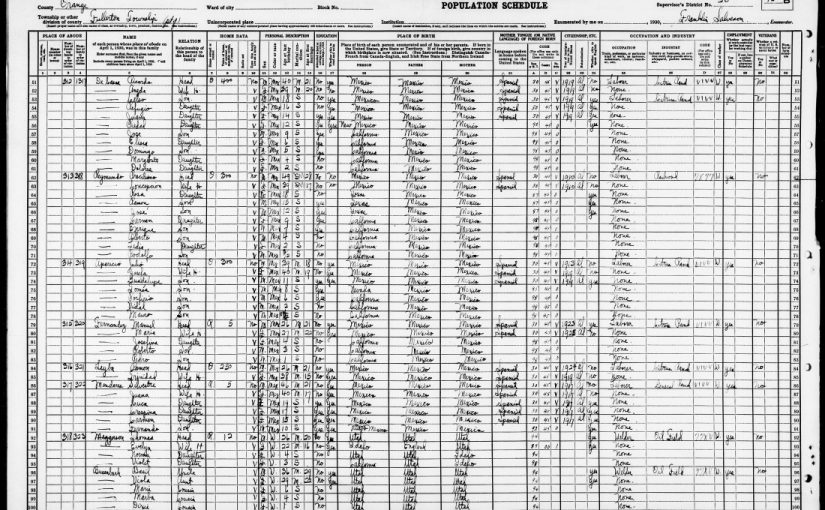Be careful then how you live, not as unwise people but as wise, making the most of the time, because the days are evil. So do not be foolish, but understand what the will of the Lord is. Do not get drunk with wine, for that is debauchery; but be filled with the Spirit, as you sing psalms and hymns and spiritual songs among yourselves, singing and making melody to the Lord in your hearts, giving thanks to God the Father at all times and for everything in the name of our Lord Jesus Christ.
Be subject to one another out of reverence for Christ. Wives, be subject to your husbands as you are to the Lord. For the husband is the head of the wife just as Christ is the head of the church, the body of which he is the Savior. Just as the church is subject to Christ, so also wives ought to be, in everything, to their husbands. Husbands, love your wives, just as Christ loved the church and gave himself up for her, in order to make her holy by cleansing her with the washing of water by the word, so as to present the church to himself in splendor, without a spot or wrinkle or anything of the kind—yes, so that she may be holy and without blemish.In the same way, husbands should love their wives as they do their own bodies. He who loves his wife loves himself. For no one ever hates his own body, but he nourishes and tenderly cares for it, just as Christ does for the church, because we are members of his body. “For this reason a man will leave his father and mother and be joined to his wife, and the two will become one flesh.” This is a great mystery, and I am applying it to Christ and the church. Each of you, however, should love his wife as himself, and a wife should respect her husband.
Ephesians 5:15-33
My sermon from the 13th Sunday after Pentecost (August 19, 2018) on Ephesians 5:15-33. Listen to the recording at the bottom of the page or read my manuscript below.
****************************
The readings from the Bible we hear on Sunday morning are not set in stone. They can be changed. Traditionally, our community follows the Revised Common Lectionary, a 3 year cycle of readings that assigns specific texts to specific Sundays and days of the week. The lectionary is used by many different Christians denominations, including Catholics, Presbyterians, Lutherans, Methodist; and serves as a powerful reminder that our differences as Christians does not replace our unity as members of the body of Christ. I like the lectionary because it invites us to spend time with all 66 books of the Bible instead of only my personal favorites. But the lectionary doesn’t show us everything. And it sometimes goes out of its way to avoid the more difficult writings on Sunday mornings. I consider a text difficult if I don’t want it read out loud when my two young kids are in the room. The bible is full of these kinds of passages, especially ones used to justify the atrocities we commit against each other. Wars, genocide, slavery, and sexual assaults – it’s all in there. I prefer a bible passage telling me to do something really hard, like love my enemies. But I’m less comfortable with a passage like Psalm 137, which celebrates the brutal killing of my enemies’ children. The lectionary tries to avoid these biblical texts of terror. But there are times when, I think, the Spirit wants us to engage these uncomfortable texts. And so that’s why I chose to expand our reading from Ephesians today, making sure we heard about wives, and husbands, and “being subject to.”
Now, these verses, especially 22 through 24, can be hard to hear because the universal church has used these verses terribly. I’ve seen writers use Ephesians 5 to deny a woman’s individuality and the gifts God gave her. I’ve seen church leaders use this passage to encourage wives to stay with their abusive husbands and partners. This text, along with others, is why women weren’t allowed to become pastors or even serve on their church council – which is a position that dominates many Christian churches today. It was thought that a wife, regardless of her vocation or her calling, would never be able to lead men because she would always be led by one. So this is an odd text to hear in our context because Lutherans have ordained women as pastors for the last 45 years. The bishop of New Jersey, Tracie Bartholomew, has preached from this pulpit and presided over that altar. And in the history of Christ Lutheran Church, we’ve had one woman pastor, held at least one ordination for a woman, and have had countless women leaders, including council presidents, who have lead this church. This kind of change is still relatively recent, especially when compared to the 2000 years of history that came before it. But we now recognize that gifts for leadership are not bound to any one gender. The Holy Spirit has helped us discover the more inclusive church we are called to be. This text from Ephesians doesn’t seem fully relevant to us anymore. So we might want to ignore it. But this text is still in our bibles. We can’t pretend it’s not there. Instead, we can use the Spiritual gifts God has given us – gifts of knowledge, experience, intellect, and guidance – to engage our bible seriously and faithfully. So, with all of that, what can we do with a text asking wives to be subject to their husbands?
Well, we can first figure out what this text actually is. These verses continue the moral teachings started in Ephesians 4. Our life with Christ has something to say about how we treat each other and ourselves. Yet our connection to Jesus, while made real in our baptism, in holy communion, and in our faith, is still pretty mysterious. It’s hard to know exactly what life with Jesus looks like even in our most intimate relationships. The author of Ephesians looked around in his cultural context and noticed people living in ancient Roman households. Now, all households are different, but every society has a vision of what they think a family unit should look like. Think of the rules we hear in Ephesians as Rome’s version of the Leave it to Beaver, 1950s vision of what home life should be like in the United States. The author of Ephesians took this idealized model of the Roman household and showed how Christ matters there. But he also used the Roman household as a model and a metaphor for what our collective life with Christ might look like. This metaphor is tricky because a Roman household assumes that certain people, because of their gender and their social status, are entitled to having power over others. When these assumptions are not questioned or examined, then our model for Christian community and the Christian home ends up being very Roman. So when we see a hierarchy, with some at the top and others at the bottom, we want to be the ones who stay on top. Which is why some, I think, have clung to this text from Ephesians even though it’s rooted in a Roman cultural concept developed almost 2,000 years ago.
So when we listen to this text and see the cultural hierarchy imported into it, we discover the flaw within it. Every model for living that we take from our cultural context and merge into our life with Christ will always be an imperfect metaphor because we are imperfect. We are sinners. And as we try to flesh out what the mystery of living with Christ looks like, the models we use will never be as perfect as we want to be. We will latch onto models and metaphors that give power to some while denying it to others. And people, especially men in the church, have too often used that power for harm. The church continues to struggle with this text because, in my opinion, we haven’t paid enough attention to what it actually is. We haven’t always recognized how the Roman household was imported into it. And, at the same time, we didn’t noticed what Christ is doing in that household. Since wives are named first, we focused on making them subject to their husbands. But we didn’t see that the “obligation of the husband to love is treated more extensively than the obligation of the wife to be subject.” We didn’t notice how “the radical thrust of the gospel is putting pressure on those who have authority and power.” (Brown, Introduction to the New Testament, 1997). We spent so much time trying to assert our power over others, that we forgot what Jesus actually does with his authority and power. We’re not here to try to hold onto our power or keep it only for ourselves. Rather, as people baptized into Christ, we are heirs to Jesus’ mission and his ministry. We have, because of Christ’s self-sacrifice and love, been given a deep and ever present relationship with the creator of everything. So our life together, in our churches, in our neighborhoods, in our families, and even in our marriages – our life together isn’t about what power and authority we think we’re entitled to. Instead, our life together is about how we get to like Christ to one another.
As human beings living in a very human world, we will always create new idealized models of how we think life should be led in communities and in families. But none of these models will match fully the Christian life we’re called to lead. Some of the models will work for a time but, eventually, they will be replaced by something else. Yet regardless of the model we find ourselves living in, our life in Christ commits us to changing those models so that we can empower and give new life to those around us. We get to help all people, including our spouses, and the most vulnerable, live the lives God is calling them to live. The model that demanded a wife be subject to her husband is fading into a new reality where we together help all women lead the body of Christ. The idealized models we use to imagine our communities, our homes, and our churches will change. The old ways will turn into something new. But because we are faithful, loved, and fed by Christ at his table, there is one model for Christian living that will never fade away. All of us, regardless of our gender and our marriage-status, are called to seek out what we can give up so that everyone around us can love, live, and thrive.
Amen.
Podcast: Play in new window | Download


